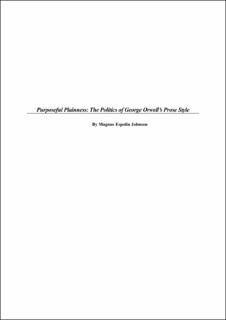Purposeful Plainness: The Politics of George Orwell’s Prose Style
Master thesis
Permanent lenke
https://hdl.handle.net/11250/2779088Utgivelsesdato
2021Metadata
Vis full innførselSamlinger
- Student papers (HF-IKS) [903]
Sammendrag
This master’s thesis aims to explain how to read George Orwell as a writer and prose stylist who strived to make political writing into an art. It studies how textual effects of his prose style connect with his political agenda. Through engaging with his own meta-commentary on language, scholarly arguments, and close readings of his texts across genres, the thesis identifies central stylistic characteristics of his plain prose style and explains how they function politically within his texts. Through simplifying words and syntax while also being highly sentient to readers’ developing responses, Orwell constructs engaging and perplexing textual effects that, while deriving aesthetic pleasure on their own, also induce the reader toward agreeing with him politically. Considering the political push behind his prose style, the thesis also engages in the critical conversation surrounding the truthfulness of Orwell’s observational reportages. By analyzing several of his major reportages, it suggests that Orwell’s truthfulness is not hurt by, but dependent on his ‘propagandized’ approach to writing. Finally, the thesis provides an extended interpretative analysis of propaganda in Animal Farm (1945), pointing to key ways Orwell’s satirical style functions in the service of political beliefs. It concludes by suggesting that the issue of propaganda in the beast fable lies not on the liars themselves, but on the willingness of being deceived. Such a finding urges us as readers to think critically about how we approach Orwell’s plain narratives considering their underlying propagandistic push. In short, the thesis argues that Orwell’s plain prose style is thoroughly propagandistic while simultaneously enabling a remarkable truthfulness, a combination which contributes to the fallacy of interpreting his political commentary as the plain truth.
